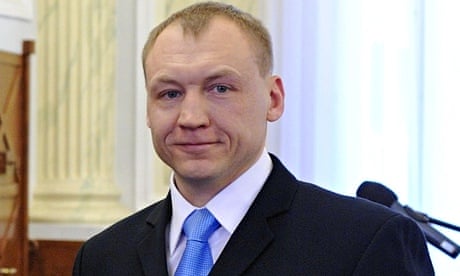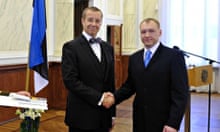The Estonian intelligence official seized by Russia thought he was going to meet an informant in a secluded spot on the border as part of an organised crime investigation but instead walked into an FSB trap, according to Estonian security sources.
Eston Kohver went to the arranged meeting at 9am on Friday in woodland near the village of Miikse, about five miles north of the official Luhamaa border post. He had armed backup in the form of Estonian security officers nearby but they were unable to react in time because of the use of flash grenades and because their communications were jammed.
By the time they realised what has happening, Kohver had been dragged into the woods on the Russian side of the border by a group of gunmen.
Kohver is now in Moscow where he is awaiting formal charges. Russian media have suggested he could be accused of spying; a pistol, a recording device and €5,000 in cash were displayed on Russian television as evidence.
Estonian security sources confirmed that all the items were Kohver's but said it was entirely routine for him to be carrying them. The recording device and the cash were intended for the informant he thought he would be meeting.
The sources said he was at the early, information-gathering stages of an investigation into a suspected smuggling operation, and noted that elements of the FSB – the Federal Security Bureau, successor to the Soviet KGB – were heavily involved in trafficking of contraband products across the European Union's easternmost border with Russia.
The Russian government claims that Kohver was spying inside Russian territory. Estonia says that in the immediate aftermath of Friday's incident, Estonian and Russian border guards conducted a joint investigation of the site which found impact craters from the grenades on the Estonian side and multiple footprints on a sand cordon on the border, suggesting that a group of men had crossed from Russia.
Border guard representatives from both countries are due to meet, and the Estonians will ask their Russian counterparts to confirm the findings of the joint investigation. If the Russians refuse, the Estonians may decide to publish the original incident report.
The head of the Estonian internal security service, Arnold Sinisalu, said his officers were under strict orders never to cross the border. He said the security officers accompanying Kohver had not been able to react fast enough to stop the abduction.
"One must take into account the thick smoke the explosive device produced, and when the forces reacted Eston Kohver was already taken to Russia," Sinisalu told Estonian reporters.



Comments (…)
Sign in or create your Guardian account to join the discussion